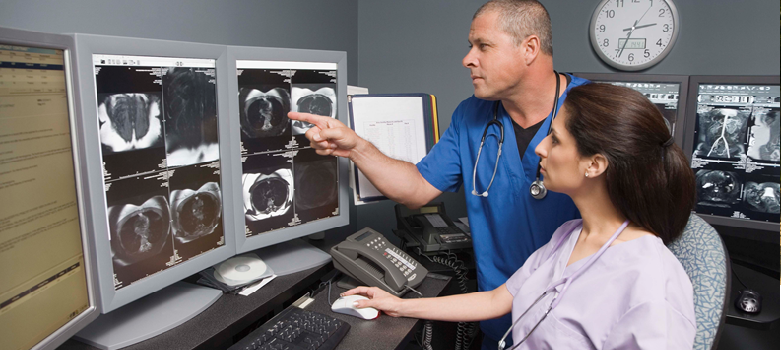
Diagnostic tests are an important part of a patient visit at Sparta Community Hospital, serving as an important tool in determining the appropriate treatment for your care.
In addition to advanced technology and equipment available at Sparta Community Hospital, our diagnostic team includes highly skilled healthcare professionals with the knowledge and expertise your physician needs for accurate tests. Using advanced equipment, our diagnostics team will provide valuable information to your physician to create a custom treatment plan that’s right for you
You’ll also find a personal touch level of care is part of every visit, which is most often provided by friends and neighbors from our community who treat you like family. Many patients find there is no need to drive out of town for advanced care when it is available right here at home. .
In our diagnostics department, you’ll find:
Highly skilled providers: specialized training enables our providers to present higher accuracy when reading and interpreting results.
Advanced technology: our team uses advanced technology to quickly provide clearer, more detailed results for your physician.
Collaborative care: we will provide results to your physician within hours of your test so that a treatment plan can begin quickly.
Convenient care: located here in Sparta, there is no need for you to go out of town for high quality diagnostics.
Safe care: patient safety is our top priority. Our promise to you is to provide high quality images while minimizing exposure to radiation.
Diagnostic Imaging at Sparta Community Hospital includes:
Diagnostic X-ray
An X-ray is a test that is used to diagnose injuries of the skeletal system. An X-ray sends photons through the body, which are transferred onto a digital film. These films are used by the physician to diagnose any injuries. Sparta Community Hospital uses the most modern digital fluoroscopy machines available.
Ultrasound
An ultrasound is a test that uses sound waves to develop images of your internal organs. These sound waves are at a frequency that is undetectable by the human ear. A devise called a transducer is used to direct the sound waves into your body. The transducer then reads those sound waves that are bounced back by your organs to create an image. These images are then used to create a “Picture” of your internal organs. The “Picture” is in real time and moves along with your internal organs. These examinations are pain free and current evidence shows no health risk from the sound waves that enter the body during this exam. Sparta Community Hospital uses two top of the line GE ultrasound units.
3D Mammography
The Genius™ exam provides better, earlier breast cancer detection compared to 2D alone. Greater accuracy means better breast cancer detection and a reduced chance of additional screenings. Learn more >>
Digital Mammography
Because there is no waiting for a film to be developed, digital images are immediately available. This means patients spend less time in the exam room. The digital machine is fast, allowing patients less time to be in an uncomfortable position. Brightness, darkness and contrast can be adjusted and sections enlarged making reading easier, especially for patients with dense tissue. Digital images are easily stored and retrieved. Digital mammography is considered a preferred diagnostic tool for women who are either under the age of 50, have very dense or extremely dense breast tissue, are still menstruating or are perimenopausal (starting menopause), but have had a period within the previous 12 months. Talk with your doctor about having a digital mammogram.
Magnetic Resonance Imaging (MRI)
An MRI is a powerful magnetic system used in conjunction with radio waves to cause hydrogen atoms or other selected elements in the body to give off faint signals. The signals help to form visualization of your internal organs and structures. Since MRI Exams are ‘non-invasive’ there are none of the dangers associated with surgery and the exams are completely painless. MRI images typically are of fine clarity and detail, helping your physician in his or her diagnosis of potential problem areas.
Nuclear Medicine
Involves the use of radioactive materials to help diagnose and treat a wide variety of diseases and disorders. The patient is given a radiopharmaceutical, which travels through the body, giving off gamma rays (invisible radiation). The nuclear medicine camera detects the gamma rays and creates pictures of the part of the body being studied. A fast and painless procedure, an MRI can eliminate the need for some exploratory surgery and is recognized as one of the most important contributions to medicine in this century due to its diagnostic precision and accuracy. Sparta Community Hospital also offers Cardiac Scoring, Virtual Colonoscopy and Bone density scans using our CA unit.
Dexa Scan
A bone density test determines if you have osteoporosis — a disorder characterized by bones that are more fragile and more likely to break.
Bone density tests are recommended for all women age 65 and older, and for younger women at higher-than-normal risk for a fracture. Men may want to discuss osteoporosis screening with their doctor if they’re over age 70 or at high risk for thinning bones.
For more information about Sparta Community Hospital Diagnostics, call 618-443-2177, extension 1396.
